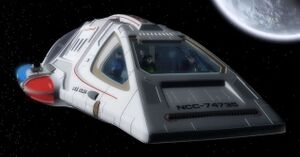User:CrimsonTacit/Arcturus/Arcturus Auxiliary Craft
More actions
Like all Odyssey-class starships, the Arcturus is equipped with a large complement of embarked craft, which includes shuttlecraft, runabouts, and two integrated auxiliary vessels.
Shuttlecraft
Shuttles aboard the Arcturus are found in three types, allowing for a wide variety of mission types to be conducted. These shuttles were named by Elizabeth Hayden for famous 20th-century jazz musicians while the Arcturus was under her command.
Type-12 Personnel Shuttles

Type-12 personnel shuttles are fast, capable of sustaining warp 7 for missions that take them far from their mothership. They are more cramped than the other types, though, and generally are only suitable for carrying two or three people. In a pinch, they can seat up to six between the small aft compartment and the pilots' stations forward. They are mostly used for scouting missions.
- #1 - Miles Davis
- #2 - Duke Ellington
- #3 - Louis Armstrong
- #4 - Charlie Parker
- #5 - John Coltrane
- #6 - Thelonious Monk
- #7 - Dizzy Gillespie
- #8 - Billie Holiday
- #9 - Count Basie
- #10 - Lester Young
- #11 - Benny Goodman
- #12 - Art Blakey
Type-14 Personnel Shuttles

Type-14 personnel shuttles are used for most short and medium-distance missions, ranging from ship-to-orbit transport of away teams to surveys in other parts of the system that Arcturus happens to be in. They can carry large teams in comfort and speed, but lack the defensive and mission equipment capabilities of runabouts.
- #13 - Nat King Cole
- #14 - Ornette Coleman
- #15 - Max Roach
- #16 - Coleman Hawkins
- #17 - Bill Evans
- #18 - Keith Jarrett
- #19 - Wynton Marsalis
- #20 - Oscar Peterson
- #21 - Chet Baker
- #22 - Sarah Vaughan
- #23 - Freddie Hubbard
- #24 - Stan Getz
Executive Shuttles
In addition to the six standard Type-12 shuttles carried in the main shuttle bay, two additional uprated Type-12A shuttles are carried in the Executive Vehicle Bay, which is located in the secondary hull between the two forward torpedo launchers beneath the separation plane. They are reserved for the use of the captain or the admiral and serve the historical nautical purpose of a captain's gig or admiral's yacht, which is the fast and discrete transport of these two very senior officers. With an even higher top speed, they have been further modified to include a private head, a dining area for two, and a fold-down bunk in the aft compartment.
Captain Lancaster had these two shuttles and the bay holding them built after expressing his dissatisfaction with the Da Jiao. Unique to the Arcturus, the Executive Vehicle Bay was wedged into an area of the ship formerly home to an auxiliary targeting array. It's just large enough to contain the two parking berths for the shuttles, which face inwards towards a vehicle replicator and turn-table. The vehicles are moved into launch position via an overhead tractor beam. Special magnetic latches attach to the underside of the shuttle, which propel it forward through a launch tube to aid in quick deployment. If launched at warp, these shuttles can sustain much higher speeds than they would normally be capable of. They are named after the hero-protagonists of the two Homeric epics, originally with the Odysseus serving Admiral Hayden in a blue-and-gold flag officer's livery, and the Achilles serving Captain Lancaster in standard red markings. They both now bear red-and-gold markings and serve Fleet Captain Lancaster.
- #E1 - Achilles
- #E2 - Odysseus
Runabouts
In her role as an exploratory flagship, the Arcturus uses its fleet of runabouts to conduct scouting missions in support of the ship's own exploratory duties and those of other starships in the area. In order to maximize the amount of area that can be covered at any one time, the ship embarks only the smallest runabouts, the Volga-class, apart from one Waverider-type atmospheric scouting vessel.
Volga-class runabouts

The Volga-class runabout is the smallest runabout in Starfleet's inventory, but it has significant advantages over shuttles in terms of both range and carrying capabilities. A typical scouting mission will involve a crew of six, but they can carry up to twenty people for more involved missions. In an emergency, they can carry up to forty over short distances. Though they are not modular like the older Danube or much larger New Atlantic, their main cabin area behind the cockpit can be reconfigured as needed. The default configuration of the Volgas aboard the Arcturus is optimized for reconnaissance duties. In most circumstances, about half of these runabouts are on away missions at any given time, with one on standby for immediate deployment and the remaining craft either undergoing overhauls or in storage. They are named for rivers in New York, the home state of Elizabeth Hayden, and bear a registry number derived from the mothership's but without the USS prefix assigned to fully independent runabouts.
- NCC-84000/3 - Hudson
- NCC-84000/4 - Mohawk
- NCC-84000/5 - Saint Lawrence
- NCC-84000/6 - Genesee (Destroyed in 2399)
- NCC-84000/6A - Genesee
- NCC-84000/7 - Delaware
- NCC-84000/8 - Susquehanna
- NCC-84000/9 - Raquette
- NCC-84000/10 - Niagara (Destroyed in 2399)
- NCC-84000/10A - Niagara
- NCC-84000/11 - Sacandaga
- NCC-84000/12 - Oswegatchie
- NCC-84000/13 - Ausable
- NCC-84000/14 - Allegheny
Waverider-class atmospheric transport
Built for the Nova and Rhode Island-class starships, the Waverider atmospheric transport is a large runabout that handles exceptionally well in atmospheric environments. As it is also warp capable, it is a good all-rounder exploration vehicle. A former science officer, Admiral Hayden requested one of these vessels be detailed to the Arcturus because she foresaw the need for enhanced exploratory support. The original Waverider was destroyed in 2399, during a terrorist incident. Both it and the replacement are named after the musician Ella Fitzgerald.
- NCC-84000/2 - Ella Fitzgerald - Destroyed, January 2399.
- NCC-84000/2A - Ella Fitzgerald II
